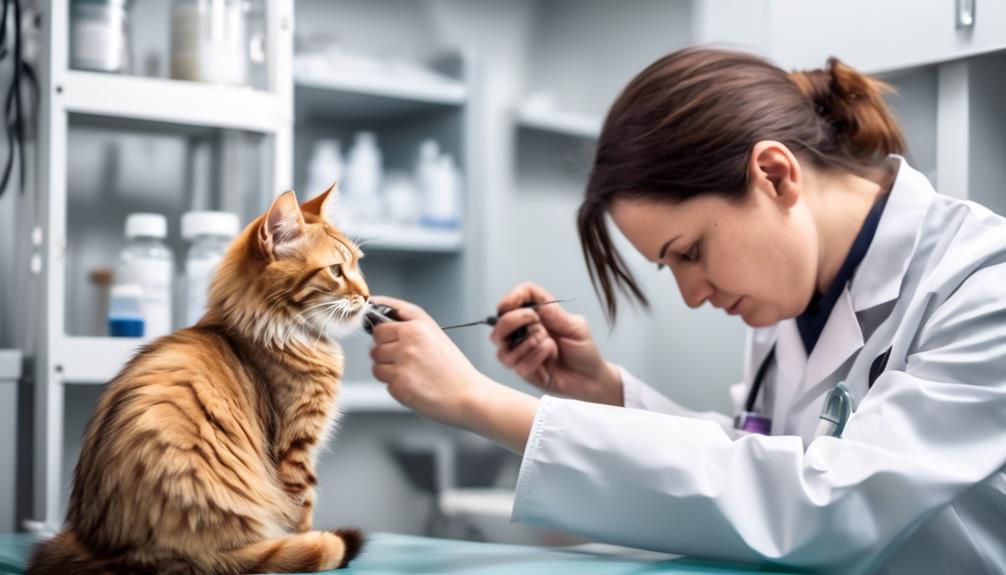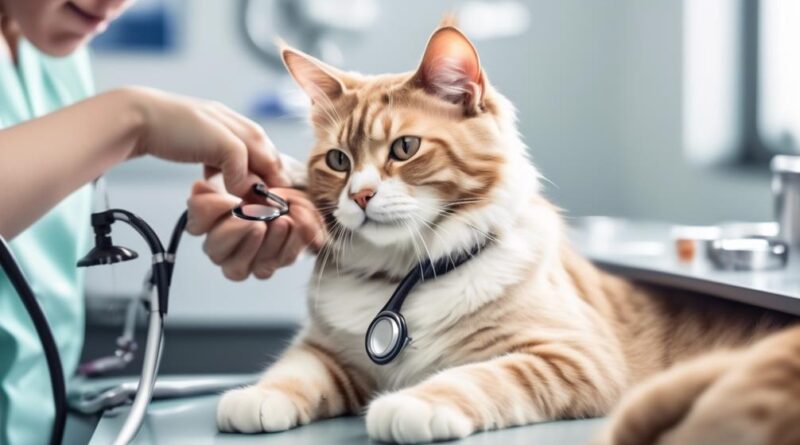What Makes Regular Vet Checks Crucial for Cats?
Just like a well-tended garden needs regular care to thrive, your feline companion requires regular vet checks to ensure their health and happiness.
But have you ever wondered what exactly makes these check-ups so crucial for your cat?
There's more to it than meets the eye, and understanding the significance of these visits can make a world of difference in your cat's well-being.
Early Disease Detection
Regularly visiting the vet allows for early detection of potential health issues in your cat, ensuring prompt treatment and better outcomes. Symptom observation is crucial in identifying health problems in your cat. Changes in behavior, appetite, weight, or litter box habits can be indicators of underlying issues. During regular check-ups, your vet may recommend bloodwork to assess your cat's overall health. This can help detect conditions such as diabetes, kidney disease, or anemia before symptoms become severe.
Diagnostic imaging is another important tool for early disease detection in cats. X-rays and ultrasounds can reveal abnormalities in the organs, bones, or tissues that may not be apparent through physical examination alone. These imaging techniques can help diagnose conditions such as tumors, fractures, or organ enlargement at an early stage, leading to better treatment options and outcomes.
Urine analysis is also a valuable diagnostic tool during regular vet visits. It can provide insights into your cat's kidney function, urinary tract health, and potential infections. Detecting issues early through urine analysis can prevent progression to more serious conditions and improve the overall quality of life for your cat.
Preventative Care
To maintain your cat's health, it's essential to prioritize preventative care through regular veterinary check-ups and vaccinations. By staying proactive, you can help prevent potential health issues and ensure your furry friend enjoys a happy and healthy life.
One crucial aspect of preventative care is nutrition guidance. Just like humans, cats require a well-balanced diet to thrive. Your veterinarian can provide tailored recommendations based on your cat's age, breed, and any existing health conditions. They can advise on the best type of food, portion sizes, and dietary supplements to keep your cat in optimal condition.
In addition to nutrition, environmental enrichment is another vital component of preventative care. Environmental enrichment involves creating a stimulating and engaging environment for your cat to prevent behavioral issues and promote physical and mental well-being. Your vet can offer valuable insights into how to enrich your cat's surroundings, such as providing interactive toys, scratching posts, and safe outdoor access. They can also offer advice on creating a stress-free environment, as stress can significantly impact your cat's health.
Vaccination Updates
When considering vaccination updates for your cat, consult your veterinarian to ensure they receive the necessary immunizations for their health and well-being. Your veterinarian will advise you on the vaccine effectiveness and the appropriate booster schedule for your cat. Vaccines are crucial in preventing various diseases, and staying up to date with their vaccinations can significantly contribute to their overall well-being.
Understanding your cat's immune response to vaccines is essential. Your veterinarian can explain how vaccines work to stimulate your cat's immune system to produce antibodies, providing protection against specific diseases. They can also discuss any potential vaccine side effects, which are usually mild and temporary, such as lethargy or slight fever. It's important to monitor your cat after vaccinations and report any unusual symptoms to your veterinarian promptly.
Your veterinarian will outline the recommended vaccination schedule for your cat based on their lifestyle, age, and health status. This schedule typically includes initial vaccinations during kittenhood and regular booster shots to maintain immunity. Adhering to this schedule is vital in ensuring your cat's ongoing protection against preventable diseases.
Regular vet check-ups provide an opportunity to discuss any concerns about your cat's vaccinations and address any questions you may have. By staying informed and proactive about your cat's vaccination updates, you're actively contributing to their long-term health and happiness.
Dental Health
Maintaining your cat's dental health is essential for their overall well-being and longevity. Just like humans, cats require regular dental cleanings to prevent oral health issues. Here's why oral hygiene is crucial for your feline friend:
- Preventing Dental Disease: Regular dental cleanings help in preventing periodontal disease, which is common in cats. Plaque and tartar buildup can lead to gingivitis, periodontitis, and tooth decay. These conditions can be painful for your cat and may even result in tooth loss.
- Improving Overall Health: Poor dental health can lead to more than just bad breath. Bacteria from the mouth can enter the bloodstream and affect vital organs such as the heart, liver, and kidneys. By maintaining good oral hygiene, you can help prevent potential systemic health issues in your cat.
- Ensuring Longevity: Proper dental care can contribute to your cat's overall longevity. By addressing dental issues early and ensuring regular dental cleanings, you can help your cat lead a healthier and longer life.
Weight Management
Ensuring your cat maintains a healthy weight is just as crucial for their overall well-being as maintaining their dental health. Just like humans, cats can suffer from obesity, which can lead to various health issues such as diabetes, arthritis, and heart disease. To manage your cat's weight effectively, it's vital to pay attention to their dietary needs and exercise routines.
When it comes to dietary needs, it's important to provide your cat with high-quality, balanced meals. Cats are obligate carnivores, meaning their diet should consist mainly of animal-based protein. Ensure that the food you provide meets their nutritional requirements and avoid overfeeding. Measure out their portions according to the feeding guidelines provided by the food manufacturer and adjust as needed based on your cat's activity level and weight management goals.
In addition to a well-balanced diet, exercise is crucial for maintaining your cat's weight. Engage your cat in regular playtime activities using interactive toys to stimulate their natural hunting instincts. This not only provides physical exercise but also mental stimulation, helping to prevent obesity and related health issues.
Creating a stimulating environment with opportunities for climbing, exploring, and playing can also contribute to keeping your cat active and at a healthy weight.
Senior Cat Wellness
As your cat ages, regular veterinary check-ups become increasingly important for maintaining their overall health and detecting any potential age-related issues. Senior cats are more prone to various health issues, and proactive care is essential to ensure their well-being.
Here are some key aspects to focus on for maintaining the wellness of your senior cat:
- Nutrition advice: As cats age, their nutritional needs may change. Your veterinarian can provide guidance on the best diet for your senior cat. They may recommend specialized senior cat food that addresses age-related issues such as joint health, weight management, and kidney function. Additionally, they can advise on portion control to prevent obesity, which is common in older cats.
- Exercise recommendations: While senior cats may not be as active as younger ones, they still need regular exercise to maintain muscle tone and joint flexibility. Your veterinarian can suggest suitable exercise routines for your senior cat, such as gentle play sessions and interactive toys. They can also provide advice on creating an environment that encourages physical activity while ensuring your cat's safety.
Regular veterinary check-ups for senior cats are crucial for addressing age-related health concerns, and the guidance provided by your veterinarian regarding nutrition and exercise can significantly impact your cat's quality of life in their later years.
Parasite Control

Regularly administer parasite control treatments as recommended by your veterinarian to safeguard your senior cat's health and well-being. Flea prevention and deworming are crucial aspects of parasite control for senior cats.
Fleas not only cause irritation and discomfort but can also lead to allergic reactions and skin infections in older cats. Regular use of vet-recommended flea prevention products can help keep these pesky parasites at bay.
Additionally, deworming treatments are essential to combat internal parasites that can affect your senior cat's digestive system and overall health.
Tick control is equally important for senior cats as they're more susceptible to tick-borne diseases. Regularly check your cat for ticks, especially if they spend time outdoors, and use veterinarian-recommended tick control products to prevent infestations.
Heartworm prevention is also vital for senior cats, as they're more prone to developing severe complications from heartworm disease. Administering heartworm prevention medication as directed by your veterinarian can help protect your senior cat from this potentially fatal condition.
Parasite control is a critical component of your senior cat's healthcare routine. By staying proactive and following your veterinarian's recommendations for flea prevention, deworming, tick control, and heartworm prevention, you can help ensure your senior cat's continued health and well-being.
Remember to consult your veterinarian for guidance on the most suitable parasite control products and treatment schedules for your senior cat.
Behavior and Mental Health
Taking care of your senior cat's behavior and mental health is essential for their overall well-being and happiness. Just like humans, cats can experience stress and behavioral issues, so it's crucial to address these aspects of their health to ensure they lead fulfilling lives.
To support your senior cat's behavior and mental health, consider the following:
- Environmental Enrichment and Stress Reduction: Create a stimulating environment for your cat by providing scratching posts, interactive toys, and perches for them to climb. Additionally, consider incorporating hiding spots and puzzle feeders to encourage mental stimulation. Minimizing stressors such as loud noises and abrupt changes in routine can also contribute to a more relaxed and contented feline companion.
- Play Therapy and Socialization Techniques: Engage your senior cat in regular play sessions using toys that encourage physical activity and mental engagement. This can help alleviate boredom and provide an outlet for excess energy. Additionally, consider gentle socialization techniques to help your cat feel more at ease around new people or animals, which can contribute to their overall mental well-being.
Frequently Asked Questions
What Are the Most Common Behavioral Problems Seen in Cats During Vet Check-Ups?
During vet check-ups, cats commonly exhibit behavioral problems such as litter box issues, aggression, and hiding. It's important to address these issues promptly to ensure your pet's well-being and maintain a harmonious household.
How Often Should I Be Grooming My Cat's Teeth at Home in Addition to Regular Dental Check-Ups?
Regular veterinary visits are essential for your cat's dental health. Proper dental care at home, including daily tooth brushing with cat-friendly toothpaste and annual dental check-ups, can help prevent dental issues and ensure your cat's overall well-being.
Are There Any Alternative or Holistic Options for Parasite Control That I Can Discuss With My Vet?
You can discuss holistic options and natural remedies for parasite control with your vet. An integrative approach may include herbal treatments or essential oils. Always consult with your vet to ensure these alternative methods are safe and effective for your cat.
How Can I Best Support My Senior Cat's Mental Health and Well-Being as They Age?
To best support your senior cat's mental health and well-being as they age, focus on enrichment activities and mental stimulation. Provide interactive toys, scratching posts, and cozy spots for relaxation. Regular vet checks are also crucial for senior cat care.
What Are Some Signs That My Cat May Be Experiencing Stress or Anxiety, and How Can I Address These Issues With My Vet?
If your cat shows signs of stress or anxiety like excessive grooming, feline aggression, or avoiding the litter box, consult your vet. Addressing these issues with socialization techniques, environmental enrichment, and regular vet checks is crucial.
Conclusion
Regular vet checks are crucial for your cat's overall health and well-being. They help detect diseases early, provide preventative care, update vaccinations, maintain dental and weight management, and ensure senior cat wellness.
Additionally, they control parasites and monitor your cat's behavior and mental health. By staying on top of these check-ups, you can ensure your furry friend lives a long and healthy life.
So, don't forget to schedule those regular vet visits for your beloved feline companion!
